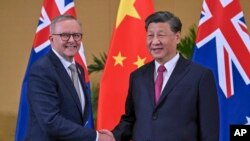Australian Prime Minister Anthony Albanese met China’s President Xi Jinping at the G-20 international summit in Bali, Indonesia. The Canberra government is hoping China will end economic sanctions after years of diplomatic tensions.
Albanese’s meeting with Xi on Tuesday is the first time an Australian leader has held formal talks with the Chinese president since 2016.
Since then, relations have gone into the “deep freeze,” according to experts, due to an extensive list of political and trade disputes.
There were allegations of Chinese interference in Australia’s domestic politics and cyber espionage. Beijing strongly denied the allegations and later accused Canberra of “anti-China hysteria.”
The bilateral relationship would suffer more damage over Australia’s concerns over China’s record on human rights in Xinjiang province, democracy in Hong Kong and its ambitions in the South China Sea and the Pacific.
Australia’s call for a global inquiry into COVID-19 and its origins incensed China, which considered it a criticism of its handling of the pandemic.
Speaking to reporters after his meeting with Xi, Albanese said talks had been positive.
“It was a very positive and constructive discussion, and I was pleased that it was held,” Albanese said. “We know that China is Australia’s largest trading partner. They are worth more than Japan, the U.S. and the Republic of Korea together, combined. So, it is an important relationship for Australia.”
Experts have said Albanese’s talks with Xi on the sidelines of the G-20 meeting in Bali, Indonesia, are unlikely to result in an immediate thaw in relations, but said they were a positive start.
Australian Treasurer Jim Chalmers told the Australian Broadcasting Corp. on Tuesday that Canberra wants an open, robust relationship with China.
“We do not pretend that we do not have big differences here,” Chalmers said. “There are big differences between our countries and we will speak up for our national interests where that is necessary. But we believe that engagement is important.”
China is Australia’s most valuable trading partner. Chinese sanctions have imposed billions of dollars’ worth of losses on Australian exporters of barley, wine and other commodities.
Analysts have said that bilateral diplomatic ties are likely to remain tense because of Australia’s close military alliance with the United States. However, they have stated that a more cordial, stable relationship with more communication would benefit both sides.




